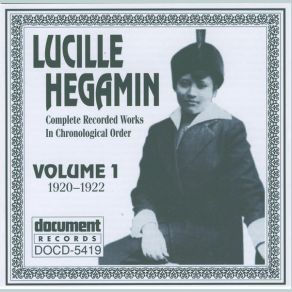Lucille Hegamin Vol. 1 (1920-1922)
Download links and information about Lucille Hegamin Vol. 1 (1920-1922) by Lucille Hegamin. This album was released in 1996 and it belongs to Blues genres. It contains 24 tracks with total duration of 01:15:47 minutes.

|
|
|---|---|
| Artist: | Lucille Hegamin |
| Release date: | 1996 |
| Genre: | Blues |
| Tracks: | 24 |
| Duration: | 01:15:47 |
| Buy it NOW at: | |
| Buy on iTunes $9.99 | |
| Buy on Amazon $8.99 | |
Tracks
[Edit]| No. | Title | Length |
|---|---|---|
| 1. | The Jazz Me Blues | 2:35 |
| 2. | Everybody's Blues | 2:47 |
| 3. | Arkansas Blues | 3:19 |
| 4. | I'll Be Good But I'll Be Lonesome | 3:17 |
| 5. | He's My Man (You'd Better Leave Him Alone) | 3:01 |
| 6. | Mamma Whip! Mamma Spank! (If Her Daddy Don't Come Home) | 3:16 |
| 7. | I Wonder Where My Brown Skin Daddy's Gone | 3:06 |
| 8. | You'll Want My Love | 3:13 |
| 9. | I Like You Because You Have Such Loving Ways | 3:24 |
| 10. | Wang Wang Blues | 3:27 |
| 11. | Strut Miss Lizzie | 3:12 |
| 12. | Sweet Mama Papa's Getting Mad | 3:23 |
| 13. | Getting Old Blues | 3:08 |
| 14. | Lonesome Monday Morning Blues | 3:18 |
| 15. | Mississippi Blues | 3:12 |
| 16. | Wabash Blues | 3:15 |
| 17. | Ain't Givin' Nothin' Away Blues | 3:10 |
| 18. | Can't Feel Jolly Blues | 3:13 |
| 19. | He May Be Your Man But He Comes to See Me Sometimes (Arto 9129) | 3:10 |
| 20. | You've Had Your Day | 3:08 |
| 21. | I've Got the Wonder Where He Went (And When He's Coming Back Blues) | 3:09 |
| 22. | He May Be Your Man (But He Comes to See Me) (997) | 3:07 |
| 23. | State Street Blues | 3:09 |
| 24. | High Brown Blues | 2:48 |
Details
[Edit]One of the first of the classic female blues singers to record, Lucille Hegamin's material was mostly drawn from the world of vaudeville rather than actually being blues. A talented singer who was reasonably versatile, Hegamin's entire output in the '20s has been reissued on three Document CDs. The initial volume covers her first 17 months on records. Highlights include "The Jazz Me Blues" (from November, 1920), "Arkansas Blues," "Wang Wang Blues," "Wabash Blues," and two versions of a future standard that Hegamin first introduced, "He May Be Your Man But He Comes to See Me Sometimes." A special bonus is a pair of instrumentals ("Strut Miss Lizzie" and "Sweet Mama, Papa's Getting Mad") from May, 1921. In most cases, Hegamin is backed by her Blue Flame Syncopators, a combo of mostly obscure players that includes her husband Bill Hegamin on piano, Ralph Escudero on tuba, and drummer Kaiser Marshall, along with four horns. Historic music that is still quite listenable; the recording quality is mostly quite good for the very early period.